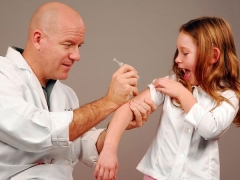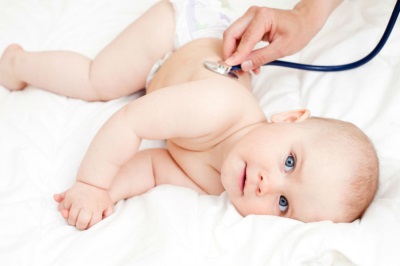Contraindications to vaccinations and what to do if a child has a cough or a runny nose?
Vaccination helps protect children from dangerous infectious diseases, however, so that vaccinations do not affect the health of the child, it is important to bear in mind that some children are contraindicated. Why does vaccination sometimes have to be postponed temporarily or canceled altogether? And can the presence of a runny nose or cough prevent the introduction of the vaccine?
True contraindications
The true contraindications include conditions in which, given the health of the child, vaccination cannot be given.
All true contraindications can be divided into general, which relate to any vaccination, as well as private, characteristic of certain vaccinations.
They can also be permanent, due to which vaccination is completely canceled, as well as temporary, which prevent the vaccine from being delivered only for a certain period.
False contraindications
This group of contraindications include subjective reasons for not being vaccinated. They come from both parents and medical staff. For example, parents may refuse to inject the vaccine if they consider their baby to be painful or allergic, and doctors may not send for vaccination with a cold or dysbiosis.
False contraindications, which most often become the cause of the "medotvod" from vaccinations, include allergies, anemia and encephalopathy. In many cases, they are not a reason for the abolition of vaccination.
When not to get vaccinated?
Contraindications to the introduction of any vaccines are:
- Immunodeficiency primary conditions.
- Oncopathology.
- Immunosuppressive therapy.
- Acute diseases.
- Exacerbations of chronic pathologies.
- Severe reactions or complications after previous vaccine administration - anaphylactic shock and other severe forms of allergy, fever over 40 degrees, local changes with a diameter of more than 8 cm, damage to the immune system, the appearance of vaccine-related diseases.
As for private contraindications, among them are the following:
Graft | Contraindications |
BCG | Weight at birth less than 2 kg (baby's skin is too thin for vaccination), the presence of keloid scar after the first vaccination |
DTP | Neurological diseases, convulsive syndrome, epilepsy (the vaccine is replaced with ADS) |
Against measles, mumps and rubella | Allergy to chicken eggs (for imported vaccines), allergy to aminoglycosides (severe form), thrombocytopenia |
Against Hepatitis B | Yeast allergy, weight less than 2 kg |
Against hemophilic infection | Hypersensitivity to tetanus toxoid, up to 6 weeks old |
Against rotavirus infection | Cases of intestinal intussusception in the past |
When, despite adverse symptoms, can you be vaccinated?
- The presence of mild diarrhea, moderate or mild reaction to the previous vaccine introduction, ARD with mild course are not contraindications to vaccinations.If the disease is moderate or severe, it is possible to vaccinate the child immediately, as his condition improves.
- The use of antibiotics is not an obstacle to vaccination. As well as taking endocrine, antiallergic, cardiac and other drugs, needed as a supportive treatment for chronic pathologies. If steroids are applied topically (inhalations, sprays, drops in the eyes, ointments), this will also not be an obstacle to the administration of the vaccine.
- Also, contraindications do not include the contact of the child with a person who has an infectious disease.
- If the baby has received blood transfusions, the introduction of live vaccines is postponed for a certain period (it depends on the type of blood product and its volume), as antibodies transfuse into the baby’s body, which prevent it from developing immunity to live vaccine viruses.
- If a child has hemophilia, then intramuscular administration of the vaccine is dangerous for the risk of bleeding, so the vaccine is placed subcutaneously in a place where it is possible to press the injection area. Also, the child is prescribed medications to support clotting.
- For the introduction of DPT are not an obstacle cases of reaction to the vaccine or seizures in a close relative. If the child's neurological diseases are stable (developmental lag, cerebral palsy), it can be vaccinated.
- The Mantoux positive reaction should not be an obstacle to vaccination against mumps, rubella and measles.
- If the child underwent surgery, it is recommended to begin vaccination 3-4 weeks after it.
- If a baby has mild anemia, it can be inoculated.
- As for allergic diseases, vaccination, if available, is, on the contrary, recommended, because they have much more serious infections (for example, if a child with asthma becomes infected with whooping cough).
- It is not necessary to refuse vaccinations to a child with congenital malformations, if his condition is compensated.
Tips
If your child has contraindications, the risks of infection increase, but this does not mean at all that the child will necessarily have those infectious diseases that vaccinations protect against. Do not forget that in addition to vaccination, immunity should be strengthened. hardening, balanced diet, walks, healthy sleep.
Discuss with your pediatrician how you can increase your baby's resistance to infections, so that nothing can stop a child from growing up and staying in the children's team.












